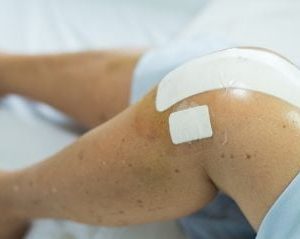- Could Your Grocery Store Meat Be Causing Recurring UTIs?
- Are You Making This Expensive Thermostat Error This Winter?
- Recognizing the Signs of Hypothyroidism
- 10 Strategies to Overcome Insomnia
- Could Artificial Sweeteners Be Aging the Brain Faster?
- Techniques for Soothing Your Nervous System
- Does the Water in Your House Smell Funny? Here’s Why
- Can a Daily Dose of Apple Cider Vinegar Actually Aid Weight Loss?
- 6 Health Beverages That Can Actually Spike Your Blood Sugar
- Treatment Options for Social Anxiety Disorder
Citrus Supplement Could Ease Swelling After Knee Replacement

A diet supplement derived from citrus fruits reduced swelling and pain after knee replacement surgery, a new clinical trial found.
The flavonoid supplement, diosmin, could offer a new approach to painful swelling after the procedure, according to a team led by Dr. Pengde Kang of Sichuan University in Chengdu, China.
“Postoperative lower-extremity swelling is a major hindrance to the enhanced recovery of patients” after knee replacement, the researchers wrote recently in The Journal of Bone and Joint Surgery.
Various strategies, including rest, cold packs and compressive bandages, have had mixed success. And no medications are available to reduce post-operative swelling, the researchers noted.
Diosmin — which is often combined with a related flavonoid called hesperidin — is used to reduce swelling in limbs of patients with disorders of the blood vessels. It is not approved as a prescription medication in the United States or Europe, but the researchers noted that experience suggests it is well-tolerated.
For the study, the team looked at 330 patients who had total knee replacement at 13 university-affiliated hospitals. They were randomly assigned to a treatment group that received a 14-day course of diosmin after surgery or to a control group that received no treatment. Both groups received standard pain medication.
Swelling at specific spots was measured four times after surgery and compared between the two groups. Pain scores, knee function, complication rates and levels of inflammation in the blood were also tracked.
Patients who took diosmin had reduced swelling at the knee, calf and thigh up to two weeks after surgery. That was associated with lower pain scores when moving the knee.
But resting pain scores, recovery of knee function and inflammatory markers were similar between the two groups. Short-term complication rates were also comparable.
Researchers said the findings offer preliminary evidence that diosmin is a safe and effective treatment for swelling and pain after knee replacement. But it is unclear how diosmin helps, since the researchers found no change in inflammatory markers between the two groups.
That might be due to the effectiveness “of the other anti-inflammatory drugs that were administered to both groups,” the researchers wrote in a journal news release. They called for further studies to learn how diosmin reduces swelling and whether some alternative dosing regimen might help more.
More information
There’s more about total knee replacement at the American Academy of Orthopaedic Surgeons.
SOURCE: Wolters Kluwer Health, news release, Dec. 22, 2023
Source: HealthDay
Copyright © 2026 HealthDay. All rights reserved.










